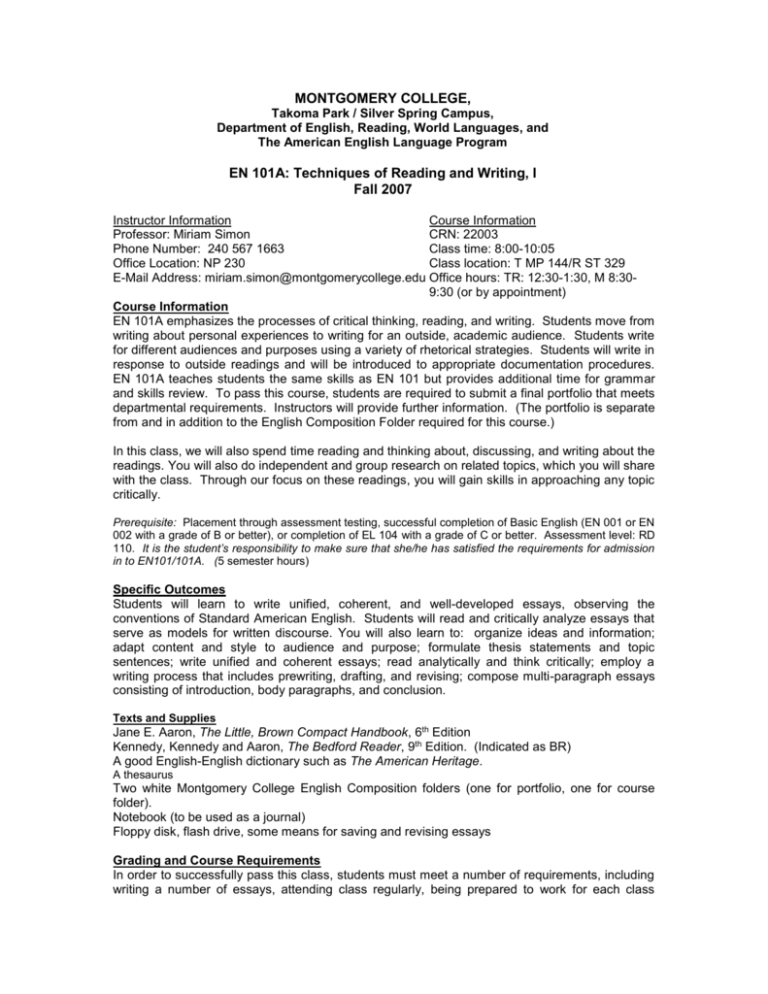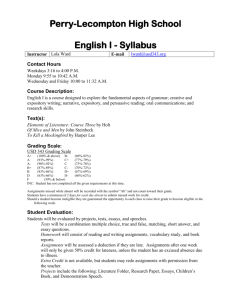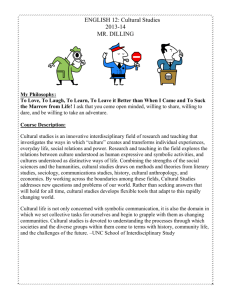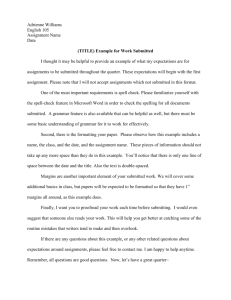Course Information - Montgomery College
advertisement

MONTGOMERY COLLEGE, Takoma Park / Silver Spring Campus, Department of English, Reading, World Languages, and The American English Language Program EN 101A: Techniques of Reading and Writing, I Fall 2007 Instructor Information Course Information Professor: Miriam Simon CRN: 22003 Phone Number: 240 567 1663 Class time: 8:00-10:05 Office Location: NP 230 Class location: T MP 144/R ST 329 E-Mail Address: miriam.simon@montgomerycollege.edu Office hours: TR: 12:30-1:30, M 8:309:30 (or by appointment) Course Information EN 101A emphasizes the processes of critical thinking, reading, and writing. Students move from writing about personal experiences to writing for an outside, academic audience. Students write for different audiences and purposes using a variety of rhetorical strategies. Students will write in response to outside readings and will be introduced to appropriate documentation procedures. EN 101A teaches students the same skills as EN 101 but provides additional time for grammar and skills review. To pass this course, students are required to submit a final portfolio that meets departmental requirements. Instructors will provide further information. (The portfolio is separate from and in addition to the English Composition Folder required for this course.) In this class, we will also spend time reading and thinking about, discussing, and writing about the readings. You will also do independent and group research on related topics, which you will share with the class. Through our focus on these readings, you will gain skills in approaching any topic critically. Prerequisite: Placement through assessment testing, successful completion of Basic English (EN 001 or EN 002 with a grade of B or better), or completion of EL 104 with a grade of C or better. Assessment level: RD 110. It is the student’s responsibility to make sure that she/he has satisfied the requirements for admission in to EN101/101A. (5 semester hours) Specific Outcomes Students will learn to write unified, coherent, and well-developed essays, observing the conventions of Standard American English. Students will read and critically analyze essays that serve as models for written discourse. You will also learn to: organize ideas and information; adapt content and style to audience and purpose; formulate thesis statements and topic sentences; write unified and coherent essays; read analytically and think critically; employ a writing process that includes prewriting, drafting, and revising; compose multi-paragraph essays consisting of introduction, body paragraphs, and conclusion. Texts and Supplies Jane E. Aaron, The Little, Brown Compact Handbook, 6th Edition Kennedy, Kennedy and Aaron, The Bedford Reader, 9th Edition. (Indicated as BR) A good English-English dictionary such as The American Heritage. A thesaurus Two white Montgomery College English Composition folders (one for portfolio, one for course folder). Notebook (to be used as a journal) Floppy disk, flash drive, some means for saving and revising essays Grading and Course Requirements In order to successfully pass this class, students must meet a number of requirements, including writing a number of essays, attending class regularly, being prepared to work for each class meeting, submitting all required assignments, and passing and satisfying departmental exit requirements such as a portfolio. The grade breakdown is: 1. 2. 3. 4. Three essays, 15% each, for total of 45% A final exam essay that includes documentation, 15% (presented for discussion during exams week) A portfolio containing two polished essays of your choice, as well as a reflective essay written in class, 25% Class participation, attendance, informal assignments, group work (including presentations), lab work and journals, 15% Essays: You will write four formal essays during the course of the semester, focusing on and using rhetorical strategies such as comparison/contrast, cause and effect, analysis, argument, and an introduction to incorporating outside sources. However, you will do a great deal more writing in total, since revision is a key component of the writing process. In addition, you will do extra writing in class and in your journals. Essays will originate in the classroom and will be developed over the course of many days, using development and revision methods, as well as small–group workshops. Essays will be graded on a number of criteria, including strong thesis, development of ideas, appropriate structure and organization, and good grammar. Assignments must be formatted according to the APA style (see The Little Brown Handbook for examples and explanation) and organized according to the professor’s instructions (reverse chronological order including the assignment sheet, all outlines and drafts). Assignments that do not follow these instructions will not be collected. Portfolio: EN 101 emphasizes the processes of critical thinking, reading, and writing. Students move from writing about personal experiences to writing for an outside, academic audience. Students write for different audiences and purposes using a variety of rhetorical strategies. Students will write in response to outside readings and will be introduced to appropriate documentation procedures. EN 101A teaches students the same skills as EN 101 but provides additional time for grammar and skills review. All sections of EN101 and EN101A participate in the portfolio assessment. To pass the course, students are required to submit a final portfolio that meets departmental requirements (see portfolio brochure for details). The portfolio is separate from and in addition to the English Composition Folder required for this course. Journals: Students will keep a writing journal in which they will write at least three times during the week, more than a page each time. The topics for these writings are fairly open, but the focus is on the readings and related class discussions. You may write about newspaper articles or TV shows you have seen that relate to our class and what we are working on, or even about conversations you have had. Occasionally, there will be a specific question or theme to write on; otherwise, you are on your own. But please do not write a diary of what you did during the day; the entries should be clearly related to something we are working on in class. Journals will be graded Pass or Fail, and will be collected at midsemester. Please be sure to bring your journals to class each day. Grammar Presentations: In groups of three, students will present brief lessons on an assigned grammar problem. You will become “experts” in the grammar area that causes them the most problems. Presentations are developed in consultation with the instructor (see separate handout for details). Lab Work and Other Assignments and Exercises: Students are required to supplement in-class instruction on grammar with independent work in the Learning Lab. You are also advised to attend tutoring sessions in order to receive additional, outside help on assignments. Please note that tutors are not editors, and that they will not rewrite, revise, or correct papers for you. There will be homework assignments, grammar quizzes, and other informal assignments (including outlines, drafts, revisions, exercises, etc.) during the 2 semester. Students need to come to class with these assignments completed. Please be sure to complete the Lab Record so that you receive credit for the lab assignment. English Composition Folder: Students will maintain a folder during the course of the semester. This folder will include all graded work and the written assignments (all drafts and outlines) for the semester, which must be clearly marked with date and description of the assignment (comparison-contrast, etc). Students will turn this folder in at the end of the semester; it is separate from the portfolio Turnitin.com: Our class will be using Turnitin.com, a plagiarism detection service. In addition to turning in printed copies of your papers in class, you will submit papers to the Turnitin.com Website on specific dates. You will need an email account and access to a computer with the Internet. You will be responsible for remembering your Turnitin.com password account. Further instructions will be given in class. Please note if you do not submit your essay before the deadline, you will not receive a grade for that essay. Classroom Policies a. Attendance: You are expected to attend each class prepared to participate in discussions and collaborative activities. Attendance is taken at the beginning of each class. If you are late by more than 5 minutes, your absence will count against you. Three late arrivals will become one absence. If you are absent, it is your responsibility to ask about any assignments and to complete them on time. If you have more than 2 unexcused absences, I may “drop” you from the class. Talk to me if you have problems or concerns. It is your responsibility, if you stop coming to class, to officially drop yourself from the course through the Admissions Office. If you do not do this, your grade for the course will result in an F and will remain on your college record as such. b. Late Assignments: Late assignments and essays will not be accepted. Students are to assume that unless you have made previous arrangements with the instructor, you will forfeit the credit for an assignment that is submitted late. Extensions are available, by permission, if requested well in advance. c. Classroom Conduct: The College seeks to provide an environment where discussion and expression of all views relevant to the subject matter of the class are recognized as necessary to the educational process. However, students do not have the right to interfere with the freedom of the faculty to teach or the rights of other students to learn. All discussion must be productive and respectful. (See Student Handbook, p. 79 for additional information.) d. Academic Honesty: The maintenance of high academic standards of intellectual honesty is the concern of all members of Montgomery College. It is expected that students will practice academic honesty. Breaches in academic honesty include plagiarism and cheating on examinations. For this class, it means that all help will be acknowledged and that students will be evaluated on work that is exclusively their own. Plagiarism of any kind will result in a 0 for the assignment, failure of the course, or may lead to disciplinary action at the college level. (See Student Handbook, pp. 80-84 for a full description.) e. Support Services: Any student who may need an accommodation due to a disability, please make an appointment to see me during my office hour. A letter from Disability Support Services (R-CB122; G-SA175; or TP-ST120) authorizing your accommodations will be needed. Any student who may need assistance in the event of an emergency evacuation must identify to the Disability Support Services Office; guidelines for emergency evacuations for individuals with disabilities are found at www.montgomerycollege.edu/dss/evacprocedures.htm. f. Cancellation of Classes: If class is cancelled due to inclement weather, students are to assume that class will resume with the work scheduled for the cancelled day. Students are always encouraged to read ahead and to continue to work on your assignments and on your grammar skills during that time. (For a recorded announcement on college closing information, check local television stations or call 301-217-8800 or 301-279-5310 or check the College 3 Website www.montgomerycollege.edu). Please note that the College does not follow same closing policies as Montgomery County Public Schools. the g. Student Responsibility: This is a college-level class in which you earn college credit, so the expectation is that students take their college responsibilities, and this course, seriously and act as responsible students. That means that you come to class prepared with all the homework done, ready to discuss and/or take part in all class activities. Being responsible also means following directions exactly and carefully and asking questions when you are not sure or do not understand the directions. Please remember that responsible college students meet with their professors regularly, especially if they are confused or need help. It means that you do much more than simply attend the class. In addition, you take responsibility for your learning, successes and failures. If you are not prepared or ready to do this, than you might want to meet with me and/or a counselor to review your options. As the professor, it is my responsibility to set high standards and work with you to reach those standards. I will work with you to develop the skills you need to succeed in EN 101A. That means more than simply assigning essays, grading your work, and conducting classes. It means being available to work with you when you request it. h. A note about email: Student e-mail (montgomerycollege.edu) is an official means of communications in this RD 103 class. Every student enrolled in this class will need to check the college e-mail regularly and frequently. You will be held responsible for information, assignments, and announcements that will be sent by the instructor. I will check my e-mail box every day between the hours of 8:00 am and 5:00 pm. I will respond to you within 24 hours. For this class, student e-mail will be used for: All time-sensitive communications; Reading material or assignments for the next class period; Out-of-class communication with the instructor; Giving feedback from the instructor to the student; I prefer that you turn in all assignments as hard copy. If for some reason you do email assignments, retain proof of the time and date each assignment was sent via e-mail. Cell phones and pagers: Please turn all cell phones and pagers off before class and leave them in your bags during class. There are no exceptions to this rule. After you read this sentence, please write the following word next to the CRN number on the first page of this syllabus: ROSEBUD. Selected Readings, Bedford Reader (this is a tentative list of readings which may change) Amy Tan, “Fish Cheeks” (94) Jamaica Kincaid, “Girl” (368) Sarah Vowell “Shooting Dad” (152) Sherman Alexie, “Indian Education” (105) Suzanne Britt, “Neat People vs. Sloppy People” (239) Bruce Catton “Grant and Lee” (258) Deborah Tannen, “But What Do You Mean?” (390) Gore Vidal “Drugs” (454) Chitra Divakruni “Live Free and Starve” (448) Colleen Wenke “Too Much Pressure” (533) Laura Fraiser “Why I Stopped Being a Vegetarian” (546) Linnea Saukko, “How to Poison the Earth” (294) Peter Singer “A Vegetarian Philosophy” (552) Anna Quindlen, “Homeless” (200) Brent Staples, “Black Men and Public Space” (205) Selected Grammar Readings and Exercises, Little, Brown Handbook, 6th Edition The Writing Process (1--) Subject-Verb Agreement (237--) Pronoun Reference (244 --) Parallelism (152--) Conciseness (177--) Sentence Variety (155) Comma Splices (283--) Quotation Marks (330--) Fragments (227--) Working With Sources (397--) Appropriate, Exact Language (160--) Research Writing (371--) Transitions Avoiding plagiarism (418--) Documentation (APA; 506---) The Sentence (141--) 4 Subordination and Coordination (146--) 5







